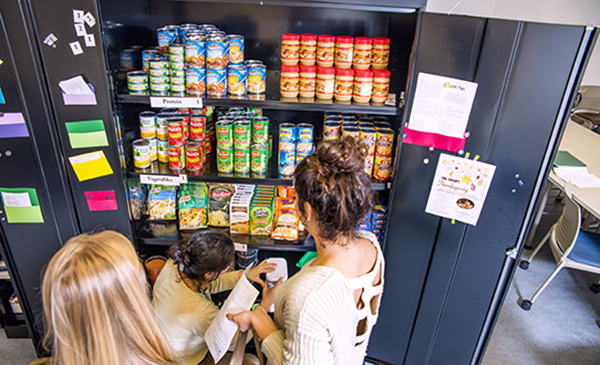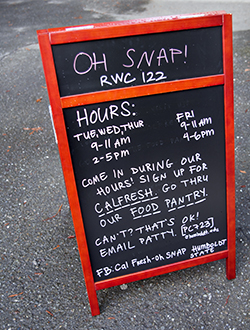
Take Patty Chang, for instance. The 23-year-old Humboldt State University social work student is trying to become the first in her family to earn a college degree. She can handle the academic demands, but has been struggling to afford food.
“Being hungry is fine for a bit, but then it starts to wear on your body,” she said.
“After a while, I get tired more easily and fall asleep sooner than usual. This makes it hard to concentrate and have the motivation to do any classwork.”
Eventually, Chang turned to HSU’s food cupboard, one of several services offered through the Food for Thought project, a new Humboldt State effort to help struggling students get enough to eat. That emergency food, along with assistance from the state food program known as CalFresh, has helped her stay in school.

She’s a success story for Food for Thought, but ultimately the project has bigger ambitions. The faculty, students, and staff who have come together to create it aren’t limiting themselves to providing food aid. They’re thinking locally and nationally, seeking ways to attack college food insecurity from all angles. That means providing food aid, offering health education and cooking lessons, conducting original research on college hunger, and seeking ways to change state and national policies that make it difficult for students to access help.
According to Jen Maguire, an HSU professor of social work who has helped students develop programs under Food for Thought, empirical research is beginning to paint a more accurate picture of college hunger. Experts cited by the Washington Post said food insecurity among college students is a growing problem around the country.
“We simply don’t have a full sense of the prevalence of food insecurity on campus,” she said. “Though from a preliminary study of a limited number of students, we know that it’s a problem.”
A campus survey of a small group of students, along with a separate student-led study found:
- 1 in 3 students said that it was often or sometimes true that, during the last 12 months, the food they had purchased didn’t last and they didn’t have money for more.
- 1 in 5 students said that they have regularly skipped meals because there wasn’t enough money for food.
- 1 in 14 students said that, at least once during the last 12 months, they did not eat for a whole day because there wasn’t enough money for food.
“Ultimately, our research and the Food for Thought Project aren’t only about pie charts and graphs. They’re about the students who need food,” said Maguire.
But for students facing various financial hurdles, buying that food can be difficult. For instance, some students use their money to cover rent. They may work (or can’t find work in a tough job market) but don’t make enough to buy healthy meals. Others send money home to support their families, or in Chang’s case, have families who don’t have the means to support them.
“It’s not as easy as charging food on a credit card or asking my family for money. That would be a fairy tale, a fairy tale that has not come true,” Chang says.
The effects of hunger can be detrimental in many ways. “Sometimes we’ll see students who can’t concentrate. They will be shaky, have stomachaches, and be distracted because they’re so hungry,” said HSU health educator Mira Friedman, who helps keep the food cupboard stocked with nutritious items.
“When those things are happening, they’re not able to perform academically as well as they normally would,” she said. Not surprisingly, some students may end up dropping out of school.
Chang still attends Humboldt State and, thanks to CalFresh, she’s able to buy groceries. She’s also involved in Food for Thought as a paid intern, helping her peers get the food they need and connecting them to other campus and community resources.
Ultimately Chang hopes Food for Thought will help the public understand the issue of college food insecurity and think about the broader implication of helping students.
“Attempting to make sure that the student population doesn’t go hungry is important to the well-being of our society,” she says.
Food for Thought is run by HSU’s Health Education and the Department of Social Work. The project’s current partners include the Department of Health & Human Services/CalFresh, the Altruistic Personality Institute and Food for People.
Information about Food for Thought is at www.humboldt.edu/foodforthought.